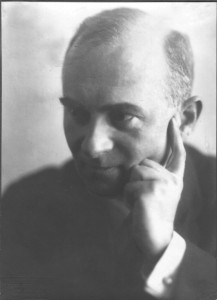 If you are interested in Jewish studies and read French, here is a fascinating book: Survies d’un Juif européen: Correspondance de Paul Amann avec Romain Rolland et Jean-Richard Bloch. This correspondance is put together, presented, annotated, and introduced by my sister, Claudine Delphis-Goettmann, and is published by the University Press of Leipzig (Leipziger Universitätsverlag). A Professor at the University of Paris VII, Claudine lives in Paris and Berlin.
If you are interested in Jewish studies and read French, here is a fascinating book: Survies d’un Juif européen: Correspondance de Paul Amann avec Romain Rolland et Jean-Richard Bloch. This correspondance is put together, presented, annotated, and introduced by my sister, Claudine Delphis-Goettmann, and is published by the University Press of Leipzig (Leipziger Universitätsverlag). A Professor at the University of Paris VII, Claudine lives in Paris and Berlin.
The history of literature rarely remembers translators, yet they are the ones who bridge cultures, hoping that an understanding between people and nations will reduce warfare. This was definitely the case of Paul Amann (1884-1958), a German Jew from Bohemia, who lived in Austria and, French at heart, translated multiple French authors into German at a time of maximum bad blood between the two countries (before and after WW1). While he was in the Austro-Hungarian forces, Jean-Richard Bloch was in the French army. While officially “ennemies,” they continued to communicate through their common friend and mentor Romain Rolland, and became even closer after the war.
This correspondence of Paul Amann with Romain Rolland (from 1911 to 1938) and with Jean-Richard Bloch (from 1912 to 1947), recounts the personal and intellectual friendship between three people no war would alter, as well as the unwavering faith in a European spirit of freedom capable of overcoming evil. Reality at some point had to sink in. Amann tried to fight off the persecution of Jews in Germany and Austria as long as he could before emigrating to France in 1939, which was not going to be safer. After harrowing months in Marseille, Amann and his family made it to Lisbon from where they sailed to the United States in 1941, accompanying fify-six Jewish children (including the ten-year-old Wolfgang Grajonca, who was to become Bill Graham), that had been rescued by l’Œuvre au secours des enfants (OSE), the American Friends Service Commitee (AFSC), and the United States Committee for the Care of Refugee Children (USC).
The life of Amann that comes across this huge correspondence is a story of an extraordinary resilience powered by a mission – a personal commitment to carrying out humanistic ideals – which enables him to survive as a penniless teacher in Moravia, overcome personal losses, or become part of the ebullient intellectual circles of the twenties and thirties, both in Austria and France, building long-lasting friendships with Stefan and Friderike Zweig, Thomas Mann, Andrée Jouve, and George Duhamel to name of few.
Amann was a typical European Jew. Adjusting to the United States was not easy, but he owed this country his life and a remarkable career for his children. His son, Peter Amann is a retired Professor of the University of Michigan – and arguably the best specialist of the French Revolution of 1848 (Revolution and mass democracy: The Paris club movement in 1848) and his daughter Eva Irrera a successful illustrator and co-founder of the Irrera Studio Arts.
Marylene Delbourg-Delphis
You can order this book (1065 pages) directly from the publisher: http://www.univerlag-leipzig.de/article.html;article_id,958
Claudine has written a significant number of articles as well as a postface to
Georg Brandes’ Nietszche. Essai sur le radicalisme philosophique, Paris, L’Arche, 2006.
She is also the author of the following books:
Wilhelm Friedmann (1884-1942). Le destin d’un francophile, Leipzig 1999
Stefan Zweig – Georges Duhamel. Correspondance. L’anthologie oubliée de Leipzig, Leipzig 2001
With Wolfgang Asholt: Jean-Richard Bloch ou A la découverte du monde connu: Jérusalem et Berlin (1925-1928), Honoré Champion, Paris, Publisher. I also write a post about this book.
Article about this book in German:
http://www.sueddeutsche.de/X5R38y/3256591/Der-Uebersetzer.html

1 response so far ↓
1 Jean-Richard Bloch, Discovering the Known World, Jerusalem and Berlin (1925-1928) // Jul 5, 2010 at 12:12 pm
[…] Survies d’un Juif européen, Correspondance de Paul Amann avec Romain Rolland et Jean-Richard Bloch (I discussed this book in an earlier post). […]
Leave a Comment